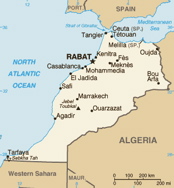RABAT, Morocco -- Elections in Morocco that were projected to hand large gains to a moderate Islamic party on Friday ended with a record low voter turnout and only incremental changes to the parliament's makeup. The Justice and Development Party (PJD), Morocco's largest opposition party, was expected to increase its representation from 42 seats to as much as 80 in the 325-seat parliament, but only managed to win 47 seats, despite competing in more districts than in the previous election. The record low voter turn out was widely interpreted as a sign that Moroccans are dissatisfied with the current government structure and election process. In 2002, Morocco held its first parliamentary elections that were considered free and fair under King Mohammed VI. Even after agreeing with the monarchy to limit the number of seats it would contest, the PJD doubled its representation in that election to become the third largest party in the parliament. Friday's election saw the PJD pass the Socialist Union of Popular Forces (USFP) to become the second largest party in the parliament. But the Independence Party, leader of the governing coalition with USFP, increased its representation to 52 seats.
Moderate Islamic Party Fails to Make Expected Large Gains in Morocco Elections

